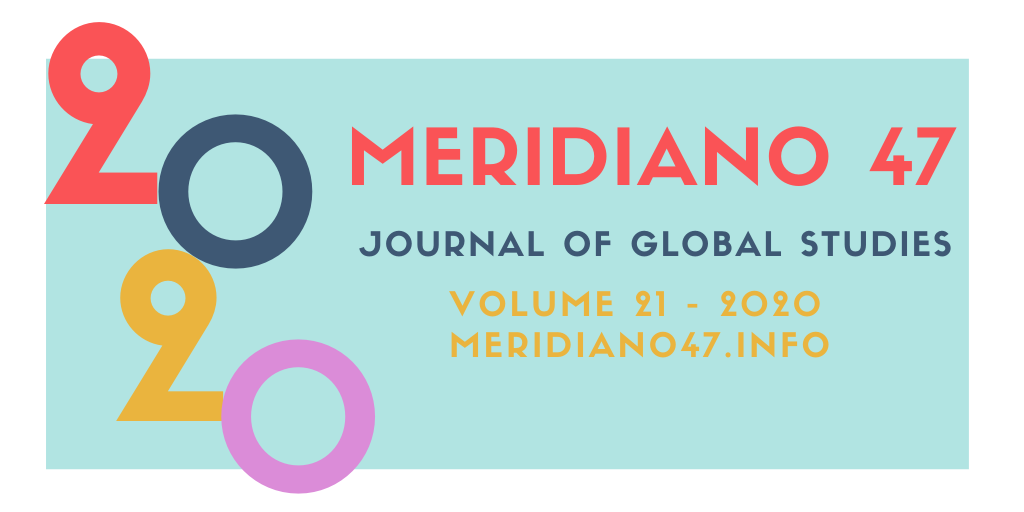Reinventing the wheel? The harmonization between the SDGs and the UN documents for non-communicable diseases risk factors
DOI:
https://doi.org/10.20889/M47e21013Keywords:
pesticides, ultraprocessed foods, multilateralism, Sustainable Development Goal, Noncommunicable diseases, Policy convergence, MultilateralismAbstract
Non-communicable diseases (NCDs) are one of the main challenges to the development and well-being of populations. Based on the documents issued by the United Nations system (FAO, ECOSOC, UNGA, and WHO), it is argued that the 2030 Agenda is partially harmonized with the recommendations of these organizations. This partial harmonization is explained through political coherence by illustrating explanatory vectors from 2005 to 2019 for products associated with NCDs risk factors: alcohol, pesticides, ultra-processed foods, and tobacco.
Downloads
References
ALLEN, L. et al. Implementation of non-communicable disease policies: a geopolitical analysis of 151 countries. Lancet Global Health, v. 8, n. 1, p.51-58, Jan. 2020. Elsevier BV. http://dx.doi.org/10.1016/s2214-109x(19)30446-2.
ASUNTA, M. Global Tobacco Industry Interference Index 2019. Global Center for Good Governance in Tobacco Control (GGTC). Bangkok, Thailand. Sept 2019.
A/RES/69/313. Addis Ababa Action Agenda of the Third International Conference on Financing for Development (Addis Ababa Action Agenda). Resolution Adopted by the General Assembly on 27 July 2015. <https://bit.ly/32f8Hft>. Access 15 Feb. 2020
BENNETT, C.. What Is Policy Convergence and What Causes It? British Journal Of Political Science, v. 21, n. 2, p.215-233, Apr. 1991. Cambridge University Press (CUP). http://dx.doi.org/10.1017/s0007123400006116.
BRIGGS, A. et al. Health impact assessment of the UK soft drinks industry levy: a comparative risk assessment modelling study. Lancet Public Health, v. 2, n. 1, p.15-22, Jan. 2017. Elsevier BV. http://dx.doi.org/10.1016/s2468-2667(16)30037-8.
CHAN, M. (2013). WHO Director-General addresses health promotion conference. Opening address at the 8th Global Conference on Health Promotion. Helsinki, Finland, 10 Jun. 2013. Available at: <https://bit.ly/39UnuyZ>. Access 21 Feb. 2020.
COLLINS, T. et al. Addressing NCDs: A unifying agenda for sustainable development, Global Public Health, 2017, 10.1080/17441692.2017.1394481
DREZNER, D. Globalization and Policy Convergence. International Studies Review. Vol. 3, n. 1 (Spring, 2001), pp. 53-78.
GOODCHILD, M, PERUCIC, A, and NARGIS, N (2016). “Modelling the impact of raising tobacco taxes on public health and finance.” Bull World Health Organ, 94: 250”“257.
INSTITUTE FOR HEALTH METRICS AND EVALUATION (IHME). Financing Global Health 2018: Countries and Programs in Transition. Seattle, WA: IHME, 2019.
KNIPE, D.; GUNNELL, D.; EDDLESTON, M. Preventing deaths from pesticide self-poisoning””learning from Sri Lanka's success. Lancet Global Health, v. 5, n. 7, p.51-52, Jul. 2017. Elsevier BV. http://dx.doi.org/10.1016/s2214-109x(17)30208-5.
KRASNER, S. Structural Causes and Regime Consequences: Regimes as Intervening Variables. International Organization, vol. 36, n.2, International Regimes (Spring, 1982), pp. 185-205.
MARTIN, L. Interests, Power, and Multilateralism. International Organization. Vol, 46, n. 4 (Autumn, 1992), pp. 765-792.
MCINNES, C.; MAHLER, A.. Competition and Cooperation in Global Health Governance. Law And Global Health, p.512-531, 29, 2014. Oxford University Press. http://dx.doi.org/10.1093/acprof:oso/9780199688999.003.0031.
MOODIE, R. et al. Profits and pandemics: prevention of harmful effects of tobacco, alcohol, and ultra-processed food and drink industries. Lancet, 2013; 381:670-79.
NUGENT, R. et al. Investing in non-communicable disease prevention and management to advance the Sustainable Development Goals. Lancet, v. 391, n. 10134, p.2029-2035, May 2018. Elsevier BV. http://dx.doi.org/10.1016/s0140-6736(18)30667-6.
PATTANAYAK, S; HAINES, A. Implementation of policies to protect planetary health. Lancet Planetary Health, v. 1, n. 7, p.55-56, Oct. 2017. Elsevier BV. http://dx.doi.org/10.1016/s2542-5196(17)30115-8.
PETTICREW, M. et al. How alcohol industry organisations mislead the public about alcohol and cancer. Drug And Alcohol Review, v. 37, n. 3, p.293-303, 7 Sep. 2017. Wiley. http://dx.doi.org/10.1111/dar.12596.
Sharjah Declaration on NCDs ”“ Civil Society United Towards 2030 (2015). Available at: <https://bit.ly/2T5EXxw>. Access 21 Feb. 2020.
STUCKLER D, SIEGEL K. Sick societies: responding to the global challenge of chronic disease. Oxford University Press, 2011.
TOWNSEND, B. et al. How do actors with asymmetrical power assert authority in policy agenda-setting? A study of authority claims by health actors in trade policy. Social Science & Medicine, v. 236, p.1-9, Sep. 2019. Elsevier BV. http://dx.doi.org/10.1016/j.socscimed.2019.112430.
United Nations high-level meeting on non-communicable disease prevention and control: NCD summit to shape the international agenda. Available at: <https://bit.ly/2HHFj8l>. Access 21 Feb. 2020.
UNITED NATIONS (2015). Transforming our World: The 2030 Agenda for Sustainable Development. Available at: <https://bit.ly/3bYhZRN>. Access 21 Feb. 2020.
UN GLOBAL COMPACT. Business Leadership Brief for Healthy Planet, Healthy People. 2019, New York, 2019.
UN GLOBAL COMPACT. Making global goals local business. 2019, New York, 2019.
UNGA A/RES/66/2. Political Declaration of the High-level Meeting of the General Assembly on the Prevention and Control of Non-communicable Diseases. Available at: <https://bit.ly/32dYlN7>. Access 21 Feb. 2020.
VAN DEN BERG H, YADAV RS, ZAIM M (2015). Setting International Standards for the Management of Public Health Pesticides. PLoS Med 12(5): e1001824. doi:10.1371/journal.pmed.1001824
WORLD HEALTH ORGANIZATION. Saving lives, spending less: a strategic response to non-communicable diseases. Geneva, Switzerland. WHO, 2018 (WHO/NMH/NVI/18.8).
WORLD HEALTH ORGANIZATION. "Best buys" and other recommended interventions for the prevention and control of noncommunicable diseases. Geneva, Switzerland. WHO, 2017.
WORLD HEALTH ORGANIZATION. Global strategy to reduce the harmful use of alcohol. Geneva, Switzerland. WHO, 2010.
WORLD HEALTH ORGANIZATION and UNITED NATIONS DEVELOPMENT PROGRAMME. What ministries of finance, tax and revenue need to know. WHO and UNDP, 2016
WORLD TRADE ORGANIZATION. Tobacco and alcohol technical barriers among members’ trade concerns. WTO, 2010.
YANG, J.; MAMUDU, H.; JOHN, R. Incorporating a structural approach to reducing the burden of non-communicable diseases. Globalization And Health, v. 14, n. 1, p.1-10, 6 Jul. 2018. Springer Science and Business Media LLC. http://dx.doi.org/10.1186/s12992-018-0380-7.
Downloads
Published
How to Cite
Issue
Section
License
Copyright (c) 2020 Meridiano 47 - Journal of Global Studies

This work is licensed under a Creative Commons Attribution 4.0 International License.



